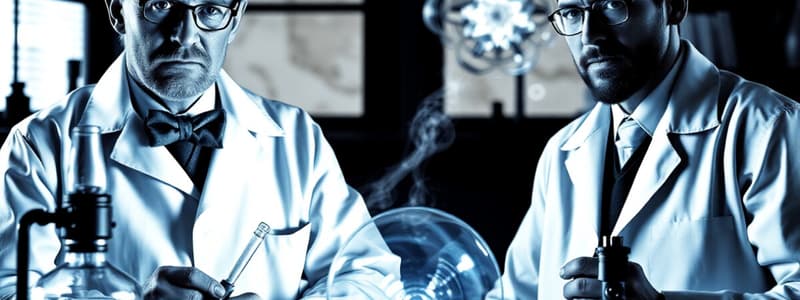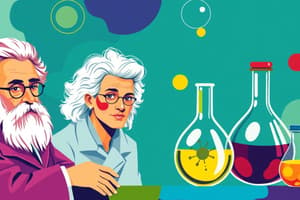Podcast
Questions and Answers
Given the nature of the provided content, what can be most reliably inferred about the purpose of the image containing a list of scientists and their contributions?
Given the nature of the provided content, what can be most reliably inferred about the purpose of the image containing a list of scientists and their contributions?
- To detail experimental procedures related to certain scientific innovations.
- To serve as a reference or index regarding notable scientists and their work. (correct)
- To showcase a specific scientific instrument and its usage.
- To offer a summarized biography of each listed scientist.
What is the biggest limitation of the given information regarding our understanding of the instrument(s) depicted?
What is the biggest limitation of the given information regarding our understanding of the instrument(s) depicted?
- The contributions of each scientist are not precisely defined.
- The type of instrument depicted is not clearly identifiable.
- Insufficient biographical details about the scientists.
- The lack of specificity regarding any particular instrument prevents deeper analysis. (correct)
If the image were part of a larger text, what kind of accompanying information would be most helpful in understanding the instruments?
If the image were part of a larger text, what kind of accompanying information would be most helpful in understanding the instruments?
- Expanded descriptions of the scientists' educational backgrounds and life stories.
- Statistical analysis of the impact each instrument has on different scientific studies.
- Diagrams and descriptions of individual instruments mentioned, explaining their functions. (correct)
- Cross-referenced citations to where these instruments have appeared in other scientific literature.
- Detailed descriptions of scientific principles related to each scientist's work.
Without additional context, what is the most likely category this image would fall under?
Without additional context, what is the most likely category this image would fall under?
Why is it impossible to offer a definitive description of a particular instrument based solely on the given context?
Why is it impossible to offer a definitive description of a particular instrument based solely on the given context?
Flashcards
Scientific Contribution
Scientific Contribution
An addition to knowledge or understanding made by a scientist.
Famous Scientists
Famous Scientists
Renowned individuals recognized for their significant discoveries or theories.
Index of Scientists
Index of Scientists
A list of scientists organized for reference, often with their achievements.
Catalog of Contributions
Catalog of Contributions
Signup and view all the flashcards
Instrument Definition
Instrument Definition
Signup and view all the flashcards
Study Notes
Scientists and Inventions
- Herschel, William: Known for work in astronomy
- Hertz, Heinrich: Associated with electromagnetic waves
- Hewish, Antony: Known for work in radio astronomy
- Hieron II: King of Syracuse, known for his inventions
- Higgs, Peter: Associated with the Higgs boson
- Hilbert, David: Known for his work in mathematics
- Hildegard of Bingen: A medieval writer and composer
- Hipparchus: Ancient Greek astronomer
- Hippocrates: Ancient Greek physician, considered the "father of medicine"
- Hiroshima: Location of a nuclear attack in WWII
- Histology: Study of tissues in biology
- Hodgkin, Dorothy: Associated with Hodgkin's disease
- Hodgkin's lymphoma: A type of cancer
- Hooke, Robert: Known for his work in microscopy and physics
- Hopper, Grace: A computer scientist
- Hormones: Chemical messengers in the body
- Horoscopes: Predictions of future events based on the stars
- House of Wisdom: An intellectual center in Baghdad during the Abbasid Caliphate
- Hoyle, Fred: An astronomer
- HTML: A markup language for creating web pages
- HTTP: A protocol used for communication over the internet
- Hubble, Edwin: An astronomer, known for Hubble's Law
- Hubble's Law: Describes the expansion of the universe
- Human ancestry: Studies of human origins and evolution
- Human Genome Project: An international effort to map the human genome
- Humboldt, Alexander von: A German naturalist
- Humors: Ancient theory about bodily fluids
- Hunter, John: A surgeon
- Hutton, James: Geologist, considered the "father of modern geology"
- Huygens, Christiaan: A Dutch physicist and astronomer
- Hydraulics: The study of liquids in motion
- Hydrogen: A chemical element
- Hydrometers: Instruments used to measure the density of liquids
- Hypatia: A philosopher and mathematician of ancient Alexandria
Physics and Chemistry
- Hygienics: The science of health and well-being
- Ice ages: Periods of significantly lowered global temperatures
- Immune system: Bodily defenses against infection
- Immunology: Study of the immune system
- Imprinting: A type of learning
- Infrared rays: Electromagnetic radiation
- Ingenhousz, Jan: A Dutch physician and chemist
- Inheritance (genetics): Transmission of traits from parents to offspring
- Inhomogenous solids: Solids with non-uniform compositions
- Insulin: A hormone regulating blood sugar
- Internet: A global network of interconnected computer networks
- Isotopes: Atoms of the same element with different numbers of neutrons
- Ivermectin: A medication
- IVF: In vitro fertilization
- Jumping genes: Segments of DNA that can move around the genome
Other topics
- Jabir ibn Hayyan: An Islamic alchemist and chemist
- Jacquard, Joseph: Invented a loom
- Jefferson, Thomas: Founding father of the US
- Jemison, Mae Carol: First African American woman in space
- Jenner, Edward: Developed a vaccine against smallpox
- Jensen, Hans: A psychologist
- Jesty, Benjamin: Known for his work in vaccination
- Johnson, Katherine: A figure associated with science or technology
Mathematics and Logic
- Joule, James Prescott: Known for his work on thermodynamics
- Joule-Thompson Effect: A thermodynamic effect
- Julian, Percy: Possibly a scientist
- Jumping genes: Segments of DNA that move around the genome
- Jupiter: A planet in our solar system
Medicine and Biology
- K-electron capture: A nuclear physics process
- Kandel, Eric: A neuroscientist
- Kekulé, Friedrich August: Known for work in chemistry
- Kelvin, Lord: A physicist
- Kepler, Johannes: Known for his laws of planetary motion
- Keratoprosthesis: A prosthetic device for the eye
- Kinetic theory: Explains the behavior of matter in terms of its constituent particles
- Kingdoms: Biological classification
- Kirchhoff, Gustav: A physicist
- Kites: Examples of aerial devices
- Koch, Robert: A bacteriologist
- Kornberg, Arthur: A biochemist
Language and Culture
- Lamarck, Jean-Baptiste: A biologist
- Land bridges: Land connections that once existed
- Laplace, Pierre-Simon: A mathematician
- Large Hadron Collider: A particle accelerator
History and Science
- Lavoisier, Antoine-Laurent de: A French chemist, known for his work in chemistry
- Leakey, Louis: A paleoanthropologist
- Learned behavior: Behaviors developed through experience
- Leavitt, Henrietta Swan: An astronomer
- Leclerc, Georges-Louis: Possibly a biologist
- Lee, Tsung-Dao: A physicist
- Leeuwenhoek, Antonie van: An early microscopist
- Lehmann, Inge: Possibly an astronomer
- Leibniz, Gottfried: A philosopher and mathematician
- Lemaître, Georges: A priest and astronomer
- Lenses: Parts of optical instruments
- Leprosy: A disease
- Leukemia: A type of cancer
- Levi-Montalcini, Rita: A scientist
- Licklider, J. C. R.: A computer scientist, pioneer of the internet
Astronomy and Space
- Light: Electromagnetic radiation
- Liebig, Justus von: A chemist
Studying That Suits You
Use AI to generate personalized quizzes and flashcards to suit your learning preferences.




